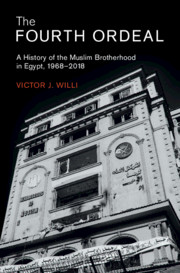Book contents
- The Fourth Ordeal
- Cambridge Middle East Studies
- The Fourth Ordeal
- Copyright page
- Dedication
- Contents
- Plates, Figures and Tables
- Acknowledgements
- Note on Transliterations and References
- Note on Sources
- Chronology of Events
- Dramatis Personae
- Abbreviations
- Prologue
- Introduction
- 1 The Society of the Muslim Brothers
- 2 The Second Founding (1968–1981)
- 3 The Rise of the Vanguard (1981–1991)
- 4 Brotherhood Incorporated (1991–2001)
- 5 Struggle for Leadership (2001–2011)
- 6 Revolution, Rise and Fall (2011–2013)
- 7 The Beginning of the Fourth Ordeal (2013–2018)
- Conclusion
- Epilogue
- Glossary
- Bibliography
- Index
- Books in the Series
- Plate Section
- Plate Section
6 - Revolution, Rise and Fall (2011–2013)
Published online by Cambridge University Press: 02 February 2021
- The Fourth Ordeal
- Cambridge Middle East Studies
- The Fourth Ordeal
- Copyright page
- Dedication
- Contents
- Plates, Figures and Tables
- Acknowledgements
- Note on Transliterations and References
- Note on Sources
- Chronology of Events
- Dramatis Personae
- Abbreviations
- Prologue
- Introduction
- 1 The Society of the Muslim Brothers
- 2 The Second Founding (1968–1981)
- 3 The Rise of the Vanguard (1981–1991)
- 4 Brotherhood Incorporated (1991–2001)
- 5 Struggle for Leadership (2001–2011)
- 6 Revolution, Rise and Fall (2011–2013)
- 7 The Beginning of the Fourth Ordeal (2013–2018)
- Conclusion
- Epilogue
- Glossary
- Bibliography
- Index
- Books in the Series
- Plate Section
- Plate Section
Summary
This chapter focuses on the two-and-a-half years from the outbreak of the Egyptian uprising on 25 January 2011 to the removal of Mohammed Morsi on 3 July 2013. The chapter excavates the debates between the Brotherhood’s revolutionary activists and the vanguard leaders in the Guidance Office, revealing an organization that grappled with questions of power and whose leaders, finding themselves increasingly at odds with the demands of the revolution, dismissed its own youth members in favour of an alliance with the military. The chapter focuses on the increasingly acrimonious debates within the Brotherhood during the transition and Morsi’s one-year presidency to reveal an organization that was incapable to adapt to the rapidly changing circumstances of a revolutionized society. It further shows how the Society’s decision-makers committed a series of fatal errors that enabled the board popular opposition against the Morsi government, which in turn allowed a resurgent military regime to oust the president. Based on sixteen months of ethnographic fieldwork in Egypt, over one hundred Oral History interviews with current and former Brotherhood members from across all organizational ranks, dozens of interviews with eyewitnesses, a wide reading of Brotherhood-related online sources and social media accounts, the reading of memoirs and articles, as well as of the available literature, this chapter traces the Brotherhood’s rapid rise and sudden fall within the unpredictable, fast-moving context of a revolutionized society.
Keywords
- Type
- Chapter
- Information
- The Fourth OrdealA History of the Muslim Brotherhood in Egypt, 1968–2018, pp. 230 - 304Publisher: Cambridge University PressPrint publication year: 2021

